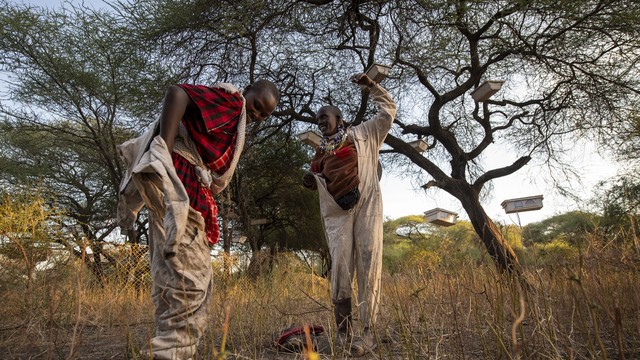Agricultural contracts and farmer agency: a shift in perspective
Support initiatives should assist farmers’ own efforts to renegotiate trading relations, rather than assuming producers gain most from integration in agribusiness-led activities.


Producer agency could include rejecting globalised supermarket chains in favour of localised alternatives, like farmers' participation in informal markets local to regional (Photo: LiseLuvs via Flickr, CC BY-NC-ND 2.0)
Contracts are the sinews of economic organisation. In agriculture, they coordinate production and trade, linking input suppliers to farmers, all the way to end-buyers such as big brands and supermarkets. They distribute risks and rewards among value chain actors and often regulate aspects such as seeds, farming techniques and product quality.
Some legal support programmes seek to improve small-scale farmers’ contracts. Much action focuses on '“contract farming', a set of arrangements whereby buyers – frequently agribusinesses – integrate farmers in their supply chains. This focus mirrors prevailing development approaches, which prioritise including farmers in agribusiness-led activities.
But contract farming often reflects the buyers’ terms. And in low- and middle-income countries, it reaches relatively few small-scale farmers – usually, the better resourced.
On the other hand, informal transactions in local to regional markets account for the bulk of staples trading. These transactions can also involve contracts: under many national laws, when a farmer offers produce and a buyer takes it in exchange for cash, the transaction constitutes a valid sales contract, transferring ownership of the produce. Also, more formalised contracts are extremely varied and include diverse supply agreements in different value chain segments.
Support initiatives premised on skewed understandings of contracts can sideline farmers’ agency, which involves farmers shaping their livelihood strategies based on their own priorities. Blind spots as regards informal markets render invisible many farmers’ main market channels and options. Conflating contracts with contract farming can create biases favouring agribusiness. And efforts to renegotiate farmers’ contracts cannot truly succeed without considering other contracts upstream or downstream.
Diverse contracts, recurring challenges
With my colleagues Emma Blackmore and Thierry Berger, I reviewed 40 agricultural contracts to explore contract diversity and complexity and ways to enhance farmer agency in trading relations. The research forms part of Empowering Producers in Commercial Agriculture (EPIC), a broader action-research project to support small-scale farmers in Malawi and Nepal and share evidence internationally.
We reviewed contracts between farmers and their immediate buyers, intermediary contracts and end-buyers’ contract templates, all the way to government contracts affecting value chain terms. Arrangements vary with commodities, geographies and supply relations.
Some contracts were for localised exchange; others applied across borders. Some reflected one-off transactions, most established longer-term relationships. A contract may govern the sale of a few kilos of produce or set terms for agro-industrial activities. Several contracts were interconnected, revealing how the terms of one can cascade into others.
Across the board, the contracts raised questions about how farmers can meaningfully exercise agency and what entry points can enable effective interventions supporting farmers’ efforts.
'From status to contract'
In my first year of law school, I was taught that contracts and agency are bound together. Nineteenth-century jurist Henry Maine theorised that human societies evolved from kinship structures shaping people’s rights and obligations ('status'), to individuals determining their rights and obligations through freely negotiated contracts.
Many now agree Maine’s theory is flawed. But the emphasis on 'freedom of contract' – whereby parties are free to enter into a contract and determine its content – represents a cornerstone of market societies.
From this perspective, farmers are free to conclude a contract and define its terms, thereby exercising agency. Contracts typically mandate certain behaviours while restricting others; this can limit options for agency during contract implementation, but parties accept the restrictions in exchange for lower risks or higher rewards.
Initiatives to help farmers 'get a better deal' provide them with favourable model provisions or help in negotiations.
Contracts and agency in practice
This framing obscures how contracts are embedded in social, economic and political contexts. In real life, agency must be fought for and is often difficult to exercise. Complex social relations profoundly affect individuals’ actions. Value chain and territorial realities can impair farmers’ choice and negotiating power, with contracts merely codifying structural inequalities.
For example, farmers’ need to earn cash, historical land use patterns and monopolistic conditions can reduce farmers’ options and negotiating power, while commodity market fluctuations influence the price buyers will pay for farmers’ harvest, regardless of how well producers negotiate.
Social differentiation matters too. For instance, patriarchal practices can restrict women’s ability to shape contracts, despite their having to fulfil them.
Also, contracts are interconnected. Market power often enables end-buyers to impose terms on first-tier suppliers, who must extend them to their subcontractors. Meanwhile, contracts between the government and a company can affect relations between the company and its suppliers.
As a result, farmers are often 'contract takers', with key terms determined by contracts they are not party to. In our report, we develop the notion of 'contracting chains' to describe this interconnectedness of contracts.
What is in the contracts?
These structural factors promote arrangements that severely constrain producer agency. Some clauses we reviewed burden farmers with price and other risks, while others subject them to monopolies or buyers’ discretion, for example to reject produce or terminate the agreement.
One contract specified that farmers must sell exclusively to the company or “be handled by the court of Law” – echoing what a businessperson told me in Nepal: that written contracts were necessary for farmers to “fear the law”. Control, not just commercial terms, is key in contracting chains.
We also found provisions that seemed to enhance opportunities for producer agency. For example, one contracting chain reflected farmer efforts to control marketing of their produce – with farmer cooperatives running outlets, and contracts facilitating sales between producers and interlinked tiers of cooperatives.
Towards a more holistic approach
For me, these findings highlight that narrow, legalistic approaches to renegotiating trading relations are unlikely to succeed. Farmers – and their organisations and support providers – may need to look not just at their own contracts but at the whole contracting chain, engaging with actors further downstream and securing a greater say in value chain coordination.
While this is difficult to achieve, examples exist – such as in Kenya’s horticulture sector, where farmers and their supporters changed certain terms by engaging not only with the immediate buyer but with the lead firm.
Addressing structural factors requires action beyond contracts. For example, improving storage and marketing infrastructure and diversifying livelihoods can expand farmers’ options and negotiating power.
Contracts raise issues of process as much as substance, interrogating wider governance systems – who has what say in contracting chains and policymaking affecting them, at which stage, and what conditions are needed for participation to be meaningful.
Farmers’ voice in public policy, then, may be as (if not more) important as their ability to negotiate with a buyer; strong producer organisations are essential in the face of power imbalances. Considering social differentiation within farming groups – for example, based on income, landholding, gender and age – is likely necessary to ensure everyone has a voice.
Supporting farmers’ priorities
Ultimately, value chain fundamentals limit what farmers can achieve in buyer-led, globalised chains. Producer agency may involve rejecting those chains in favour of more local options – such as farmers enhancing their participation in informal markets local to regional, or establishing cooperatives for alternative marketing channels.
As part of the EPIC project, vegetable farmers across three sites in Nepal are strengthening their informal trading arrangements, securing representation in local market committees, establishing cooperatives to sell in urban markets and developing supply agreements with trusted small-scale buyers – all with support from the Community Self-Reliance Centre and the Nepal Agricultural Co-operative Central Federation.
And in Malawi’s Thyolo district, small-scale tea growers – supported by the Women’s Legal Resources Centre and Imani – have been exploring not only improvements in their relationship with the estates they sell to but also ways to diversify livelihoods.
Rather than assuming farmers gain most from integration in agribusiness-led chains, policies and programmes should support farmers’ own efforts. Contracts work should take farmers, not agribusiness, as its entry point, and recognise farmers’ diverse contractual realities.
This may involve tailoring interventions to problems farmers face in informal markets, including where producers grapple with unfair terms or seek to formalise their arrangements. Paraphrasing my colleague Bill Vorley, an agency perspective on contracts requires meeting farmers where they are, rather than where external actors think they should be.
- Download the report 'Contracts in commercial agriculture: enhancing rural producer agency'
IIED’s 'Empowering Producers in Commercial Agriculture' (EPIC) initiative is funded by UK Aid from the UK government through its 'Commercial Agriculture for Smallholders and Agribusiness' (CASA) programme. EPIC aims to empower rural producers and wider communities to influence public decisions and private sector conduct for locally beneficial and more sustainable investments in commercial agriculture.



